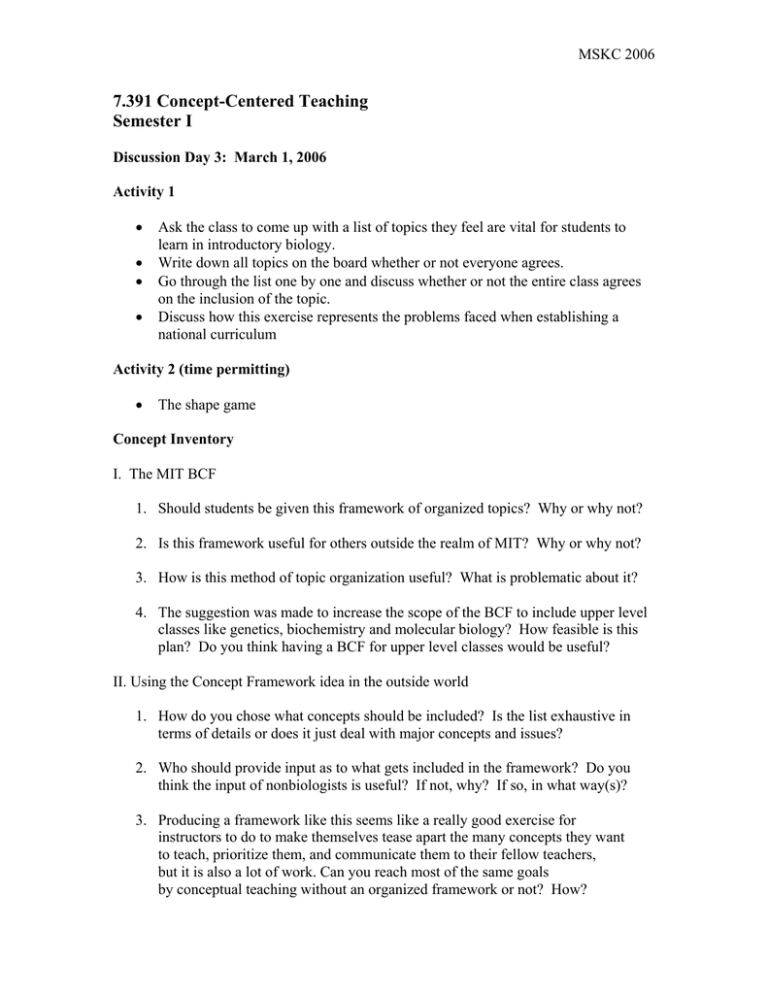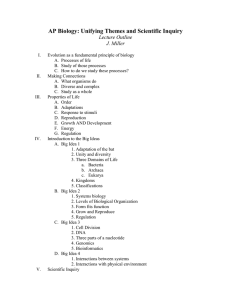7.391 Concept-Centered Teaching Semester I
advertisement

MSKC 2006 7.391 Concept-Centered Teaching Semester I Discussion Day 3: March 1, 2006 Activity 1 • • • • Ask the class to come up with a list of topics they feel are vital for students to learn in introductory biology. Write down all topics on the board whether or not everyone agrees. Go through the list one by one and discuss whether or not the entire class agrees on the inclusion of the topic. Discuss how this exercise represents the problems faced when establishing a national curriculum Activity 2 (time permitting) • The shape game Concept Inventory I. The MIT BCF 1. Should students be given this framework of organized topics? Why or why not? 2. Is this framework useful for others outside the realm of MIT? Why or why not? 3. How is this method of topic organization useful? What is problematic about it? 4. The suggestion was made to increase the scope of the BCF to include upper level classes like genetics, biochemistry and molecular biology? How feasible is this plan? Do you think having a BCF for upper level classes would be useful? II. Using the Concept Framework idea in the outside world 1. How do you chose what concepts should be included? Is the list exhaustive in terms of details or does it just deal with major concepts and issues? 2. Who should provide input as to what gets included in the framework? Do you think the input of nonbiologists is useful? If not, why? If so, in what way(s)? 3. Producing a framework like this seems like a really good exercise for instructors to do to make themselves tease apart the many concepts they want to teach, prioritize them, and communicate them to their fellow teachers, but it is also a lot of work. Can you reach most of the same goals by conceptual teaching without an organized framework or not? How? MSKC 2006 4. Should we have a national biology curriculum? If so, what topics should a national curriculum include? How would we assess that all of our students were getting all the information? 5. Should all students be required to learn the same “core” group of biology topics? 6. People have begun to suggest standardized tests should be used at the level. Could frameworks like this be used as the foundation for better standardized tests, ones that could focus on conceptual learning rather than regurgitation? How hard would it be to get a broad consensus on what biological concepts students should master if, say, a national college-level biology exam were to be written? 7. Is it valuable to have a majors class and non-majors class? Would the non-majors be better served by getting the hierarchical concepts in a class that relates to everyday life and how it relates to biology? 8. Is it better to test cross-referenced concepts together or to test concepts in a hierarchical manner? Is there a preference for students to learn in one particular manner? 9. As students many of us have been condition to learn my memorization, Do students have a hard time adjusting to learning by this concept-mapping techniques?




